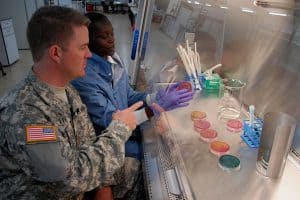
Merck Serono signs antimalarial development deal
pharmafile | April 2, 2015 | News story | Research and Development, Sales and Marketing | DDD107498, Medicines for Malaria Venture, Merck Serono, antimalarial, malaria
Merck Serono and Medicines for Malaria Venture (MMV) have signed an agreement which will see them advance the development of a potential antimalarial therapy to tackle a growing drug resistance threat.
The pairing sees Merck get the biopharma business rights to investigational antimalarial compound DDD107498, originally developed by MMV and the University of Dundee’s drug discovery unit.
The Swiss antimalarial drug R&D company will provide Merck with access to its public and private sector networks in malaria effected countries.
“Working with partners like Merck Serono is critical to the progress of potential antimalarial compounds, like DDD107498, through the malaria drug pipeline,” says Dr Timothy Wells, who is the chief scientific officer at MMV.
“DDD107498 holds great promise and we look forward to working with the Merck Serono team through the development phase.”
The two firms will collaborate to discover whether the investigational compound exerts activity on a number of malaria parasite lifecycle stages. Studies will be conducted to find out if the ingredient remains active in the body long enough to offer potential as a single-dose treatment against the infectious disease.
Luciano Rossetti, the executive vice president and global head of R&D at Merck Serono, comments: “MMV is known worldwide for its major contribution to delivering innovative antimalarial treatments to the most vulnerable populations suffering from this disease, and at Merck Serono we share this goal.”
Innovations in antimalarial resistance have never been so imperative following reports that it is now on the verge of spreading, according to a study in the Lancet Infectious Diseases journal. Opposition to a group of drugs that possess the most rapid action against malaria – artemisinin, aka Qinghaosu – is now at the risk of affecting parts India, Thailand, Cambodia and Vietnam.
Tests on the borders of India have shown that resistance to the medicine is widespread, and that almost 40% of the 940 parasite samples taken revealed artemisinin resistance.
According to the Worldwide Health Organization the tropical disease that is spread by mosquitos caused an estimated 584,000 fatalities in 2013, mostly in parts of Africa. Most deaths occur among children, but the rate has been reduced by around 58% since 2000.
Director of the Institute for Tropical Medicine at the University of Tübingen in Germany, Professor Peter Kremsner, concludes: “It’s hugely encouraging to see the German pharmaceutical industry increasing their engagement in the development of novel antimalarials.
“The Merck Serono and MMV collaboration to develop DDD107498 is a great step. It’s a compound that offers lots of promise so I’m excited to see how it progresses.”
Tom Robinson
Related Content

FDA approves Roche’s test for malaria in blood donors
Roche has announced that the US Food and Drug Administration (FDA) has approved its cobas …

WHO recommends new vaccine for prevention of malaria in children
The World Health Organization (WHO) has announced that it has recommended a new vaccine, R21/Matrix-M, …

FDA grants marketing approval for US Army’s malaria treatment
The FDA has granted marketing approval for the US Army Medical Research and Development Command’s …








